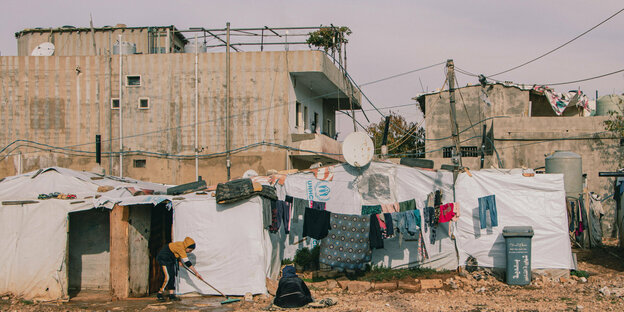The Lebanese army is deporting refugees to Syria. However, a large amount of aid money is coming to Lebanon from Germany and the EU.

Syrian refugees in Lebanon's Bekaa Valley Photo: Zuma Press/imago
FRANKFURT/M. taz | Lebanon's army is receiving millions in aid from Germany and the EU to protect the country's borders. It flagrantly violates the human rights of refugees. For example, it is said to be working with neighboring Syria's army to forcibly deport Syrians from Lebanon. This is clear from a report by the Lebanese NGO Center for Access to Human Rights (CADH). The human rights organization documented a total of 1,080 cases of arbitrary detentions and 763 cases of forced deportations to Syria in 2023.
299 deportees reported raids on their homes and interrogations during which they were mistreated, intimidated and insulted. The military collectively transported refugees to border crossings and illegally handed them over to Syrian authorities. According to the report, there is a risk of arbitrary arrests or trials in Syria, including before military courts.
Deserters, draft evaders, activists and other people classified as members of the opposition would be conscripted into the army, imprisoned, bound with iron chains or tortured. According to the report, some deportees wanted to return to Lebanon and paid smugglers to do so. Witnesses told the ACHR that the smugglers were in collusion with the Lebanese army. They reported bribe payments to soldiers.
In Lebanon, Syrian refugees suffer racism and discrimination from the army and authorities. Politicians are whipping up the estimated 1.5 million Syrians as scapegoats for the country's economic crisis. According to aid organizations, the Lebanese army destroyed refugee tents, internet routers and solar panels in the Bekaa Valley.
A Syrian man told taz that security authorities had arbitrarily confiscated his motorcycle on a Beirut street. Interior Minister Bassam Mawlawi is using large-scale raids to arrest Syrians on the streets if they do not have residence permits.
Germany money
Despite human rights violations, the Lebanese government, including directly the army, continues to receive monetary aid. “Donor countries must ensure that support to the Lebanese government does not contribute to crimes against humanity committed by the Lebanese army,” recommends the ACHR. Donor countries should put pressure on the Lebanese government, especially for non-humanitarian funds that go directly to the government and especially the Ministry of Defense.
Since 2012, the German federal government has paid Lebanon around one billion euros in humanitarian aid. In 2023 there were more than 108 million euros. Furthermore, according to the Defense Ministry in Berlin, around 6 million euros were allocated specifically for the Lebanese armed forces last year. This allowed the Navy, for example, to maintain ships and radar stations to protect territorial waters.
This year the Lebanese army will receive 15 million euros from Germany to guarantee security on the border with Israel. The Ministry of Defense does not answer whether the funds are linked to demands on the military, for example to protect the human rights of Syrians. A spokeswoman highlights the confidentiality of the agreements.
The Ministry of Foreign Affairs simply says: “In regular conversations with the Lebanese government, the federal government has often expressed concern about the forced repatriations that took place in the spring of 2023 and has demanded that the repatriations stop and that the protection of refugees is guaranteed. The federal government “still does not see the conditions for a safe return to Syria.”
CADH asks penitentiary staff to monitor
EU money also flows to the Lebanese army: this year €7 million for border protection, something the EU considers a “top priority.” Security, customs and military authorities receive financial and technical assistance to stop illegal migration, terrorists, drugs and arms trafficking. Details are still being discussed.
“The project has a strong human rights component,” says an EU spokesperson in Lebanon. This will be implemented through training on international law and regular dialogues between security authorities, customs, civil society and businesses. Accountability has also been improved through access to information and discussions. “Allegations of violations of national and international obligations will be investigated in the political dialogue with the Lebanese government.”
The ACHR calls for more military training on the proper treatment of prisoners and modern technology in detention centers to monitor staff and prevent torture. The organization also suggests that donor countries could increase their own admission rates to provide protection to Syrians facing human rights abuses in Lebanon, Turkey or Jordan.